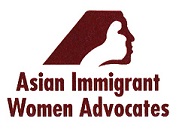AIWA believes in a culturally, linguistically, economically inclusive society, yet immigrant women and youth often face barriers to active participation within the broader society.
That’s why we developed a leadership program that empowers immigrant women and youth to develop and take their leadership skills and knowledge to scale.
Community Transformational Organizing Strategies (CTOS) provides immigrant women and youth with the resources, tools and knowledge to be progressively and systematically more involved in AIWA and social justice work, and more civically engaged. This model helps us track our members’ leadership development progress, evaluate and improve our programs, and set goals for the organization.
The model is based on a series of steps, each of which indicates a higher level of involvement for women or youth in our organization and a growth in their leadership skills. The seven stages of development are:
Knowledge of programs
AIWA informs immigrant women and youth about projects, activities, and services at AIWA.
Participation in program
Self-education
Leadership training
Active involvement
Immigrant women and youth strengthen their leadership by participating in planning and implementing AIWA projects through:
- Committees
- Community-based participatory research
- Grassroots campaigns
- Policy advocacy and
- Other member defined projects
Leadership in AIWA
Leadership in community and the broader society
Women and youth demonstrate their leadership in the workplace, their ethnic communities, and the broader society.
